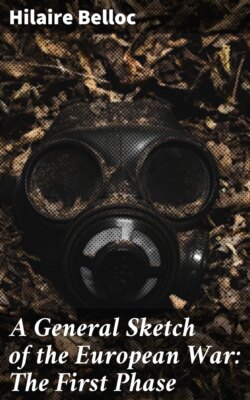Читать книгу A General Sketch of the European War: The First Phase - Hilaire Belloc - Страница 13
На сайте Литреса книга снята с продажи.
(6) The Immediate Occasion of the War.
ОглавлениеWe have seen how constantly and successfully Austria had supported the general Prussian thesis in Europe, and, in particular, the predominance of the German Powers over the Slav.
We have seen how, in pursuit of this policy, the sharpest friction was always suffered at the danger-point of Servia. Servia was the Slav State millions of whose native population were governed against their will by Austro-Hungarian officials. Servia was the Slav State mortally wounded by the annexation of Bosnia and Herzegovina. And Servia was the Slav State which Austria had in particular mortified by forbidding her access to the Adriatic, and by imposing upon her an unnatural boundary, even after her great victories of the Balkan War.
The heir to the Hapsburgs—the man who, seeing the great age of his uncle, might at any moment ascend the throne—was the Archduke Francis. He had for years pursued one consistent policy for the aggrandizement of his House, which policy was the pitting of the Catholic Slavs against the Orthodox Slavs, thereby rendering himself in person particularly odious to the Orthodox Serbs, so many of whose compatriots and co-religionists were autocratically governed against their will in the newly annexed provinces.
To the capital of these provinces, Sarajevo, he proceeded in state in the latter part of last June, and there, through the emissaries of certain secret societies (themselves Austrian subjects, but certainly connected with the population of independent Servia, and, as some claimed, not unconnected with the Servian Government itself), he was assassinated upon Saturday, the 28th of June, 1914.
For exactly a month, the consequences of this event—the provocation which it implied to Austria, the opportunity which it gave the Hapsburgs for a new and more formidable expression of Germanic power against the Slavs—were kept wholly underground. That is the most remarkable of all the preliminaries to the war. There was a month of silence after so enormous a moment. Why? In order to give Germany and Austria a start in the conflict already long designed. Military measures were being taken secretly, stores of ammunition overhauled, and all done that should be necessary for a war which was premeditated in Berlin, half-feared, half-desired in Vienna, and dated for the end of July—after the harvest.
The Government of Berlin was, during the whole of this period, actively engaged in forcing Austria forward in a path to which she was not unwilling; and, at last, upon the 23rd of July, Europe was amazed to read a note sent by the Imperial Governor at Vienna to the Royal Government in the Servian capital of Belgrade, which note was of a kind altogether unknown hitherto in the relations between Christian States. This note demanded not only the suppression of patriotic, and therefore anti-Austrian, societies in Servia (the assassins of the Crown Prince had been, as I have said, not Servian but Austrian subjects), but the public humiliation of the Servian Government by an apology, and even an issue of the order of the day to the Servian Army, so recently victorious, abasing that army to the worst humiliation. The note insisted upon a specific pledge that the Servian Government should renounce all hope of freeing the Servian nation as a whole from foreign government, and in many another clause subjected this small nation to the most thorough degradation ever suggested by a powerful European people towards a lesser neighbour.
